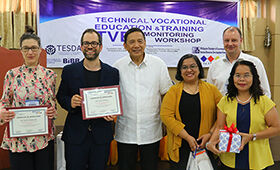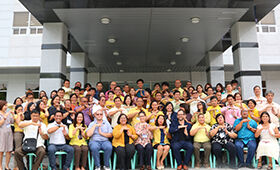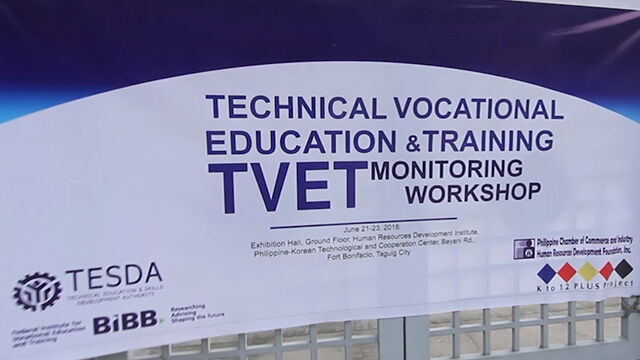First TVET Monitoring Workshop in the Philippines
BIBB in partnership with K to 12 Plus Project, Technical Education & Skills Development Authority (TESDA) and the Human Resources Development Fund of the Philippine Chamber of Commerce and Industry (PCCI HRDF) conducted its first TVET Monitoring Workshop with the goal of improving the current monitoring system of TVET in the country.
Implementation of a TVET Monitoring System in the Philippines
Improving the existing TVET monitoring system is of major importance for the further development of TVET in the Philippines. TESDA Deputy Director General Rossana Urdaneta stressed the importance of the event especially now that there is a new government administration. She said that this initiative will further address the skills mismatch.
Participants from the Commission on Higher Education (CHED), Regional offices of TESDA, National Commission of Culture and Arts (NCCA), National Economic Development Authority (NEDA), University of the Philippines School of Statistics, Philippine Statistical Authority (PSA), and other government agencies attended the workshop.
Aside from educating the participants on the current monitoring system of the country, TESDA with the support of BIBB conducted this workshop, which was held from 21st to 23rd of June in Metro Manila, to help understand the development process of an TVET report and to learn about the process for indicator development.
The following topics were in focus:
- The experts of BIBB were referring to the German VET Data report, on its historical development, the legal basis, the organizational framework for compiling an annual report, the necessary cooperation with various stakeholders, funding and timeline as well as quality assurance of the report;
- the identification of key issues and guiding questions relevant for policy makers, taking into account the experiences made in Vietnam by developing an annual TVET report Viet Nam;
- the development of indicators on the basis of predefined guiding questions with a structuring aid;
- the general preconditions for TVET reporting in regard to data environment and organizational set up;
Furthermore the participants agreed on a joint schedule until the end of the year. Within the next six month three major activities shall be conducted as soon as the new government administration has been put in place:
- Step 1: a joint workshop with all data stakeholders shall be conducted to get an overview of existing data and agencies' competencies, to discuss the comptability of data sources and to think about an institutionalized cooperation between agencies;
- Step 2: clarification of mandate for national TVET reporting and funding;
- Step 3: definition of process and timeline for compiling a national TVET report and discussing possible obstacles
BIBB cooperation agreement
BIBB has had an institutional cooperation agreement in place in the field of VET with the Philippine Technical Education and Skills Development Authority (TESDA) since September 2014. As part of the “K to 12 Plus Pilot Project on Dual Vocational Education and Training” – ‘K to 12 - Reform on the Philippines’, BIBB has been working on behalf of the development organisation sequa to provide guidance to TESDA and the PCCI since December 2014.
Background
The Philippine Government aims to use the K to 12 Reform to improve the quality of vocational education and training in the Philippines. The objective in future is for VET to be more closely aligned to the real demands of the workplace and to the requirements of the labour market in order to take equal account of the needs of modern trade and industry and of the (largely informally organised) SME sector. The reform process seeks to enhance vocational orientation and practical professional training for young people within the formal educational sector. The “K to 12 Plus Pilot Project on Dual Vocational Education and Training” aims to provide a remedy by creating dual vocational training structures. In addition to this, the Philippine Government is endeavouring to achieve greater integration of companies into the training process and striving to raise awareness of the cost-effectiveness of vocational education and training.


